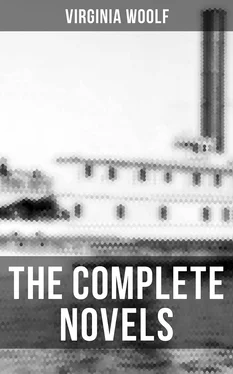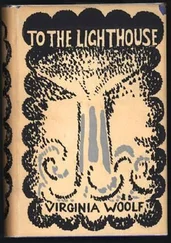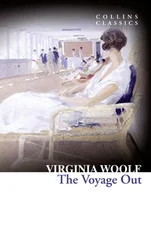“Mother?” said Rachel. Hewet’s heart leapt, and he noticed the fact. Her voice, though low, was full of surprise.
“You didn’t know that?” said Helen.
“I never knew there’d been any one else,” said Rachel. She was clearly surprised, but all they said was said low and inexpressively, because they were speaking out into the cool dark night.
“More people were in love with her than with any one I’ve ever known,” Helen stated. She had that power—she enjoyed things. She wasn’t beautiful, but—I was thinking of her last night at the dance. She got on with every kind of person, and then she made it all so amazingly—funny.”
It appeared that Helen was going back into the past, choosing her words deliberately, comparing Theresa with the people she had known since Theresa died.
“I don’t know how she did it,” she continued, and ceased, and there was a long pause, in which a little owl called first here, then there, as it moved from tree to tree in the garden.
“That’s so like Aunt Lucy and Aunt Katie,” said Rachel at last. “They always make out that she was very sad and very good.”
“Then why, for goodness’ sake, did they do nothing but criticize her when she was alive?” said Helen. Very gentle their voices sounded, as if they fell through the waves of the sea.
“If I were to die to-morrow…” she began.
The broken sentences had an extraordinary beauty and detachment in Hewet’s ears, and a kind of mystery too, as though they were spoken by people in their sleep.
“No, Rachel,” Helen’s voice continued, “I’m not going to walk in the garden; it’s damp—it’s sure to be damp; besides, I see at least a dozen toads.”
“Toads? Those are stones, Helen. Come out. It’s nicer out. The flowers smell,” Rachel replied.
Hewet drew still farther back. His heart was beating very quickly. Apparently Rachel tried to pull Helen out on to the terrace, and helen resisted. There was a certain amount of scuffling, entreating, resisting, and laughter from both of them. Then a man’s form appeared. Hewet could not hear what they were all saying. In a minute they had gone in; he could hear bolts grating then; there was dead silence, and all the lights went out.
He turned away, still crumpling and uncrumpling a handful of leaves which he had torn from the wall. An exquisite sense of pleasure and relief possessed him; it was all so solid and peaceful after the ball at the hotel, whether he was in love with them or not, and he was not in love with them; no, but it was good that they should be alive.
After standing still for a minute or two he turned and began to walk towards the gate. With the movement of his body, the excitement, the romance and the richness of life crowded into his brain. He shouted out a line of poetry, but the words escaped him, and he stumbled among lines and fragments of lines which had no meaning at all except for the beauty of the words. He shut the gate, and ran swinging from side to side down the hill, shouting any nonsense that came into his head. “Here am I,” he cried rhythmically, as his feet pounded to the left and to the right, “plunging along, like an elephant in the jungle, stripping the branches as I go (he snatched at the twigs of a bush at the roadside), roaring innumerable words, lovely words about innumerable things, running downhill and talking nonsense aloud to myself about roads and leaves and lights and women coming out into the darkness—about women—about Rachel, about Rachel.” He stopped and drew a deep breath. The night seemed immense and hospitable, and although so dark there seemed to be things moving down there in the harbour and movement out at sea. He gazed until the darkness numbed him, and then he walked on quickly, still murmuring to himself. “And I ought to be in bed, snoring and dreaming, dreaming, dreaming. Dreams and realities, dreams and realities, dreams and realities,” he repeated all the way up the avenue, scarcely knowing what he said, until he reached the front door. Here he paused for a second, and collected himself before he opened the door.
His eyes were dazed, his hands very cold, and his brain excited and yet half asleep. Inside the door everything was as he had left it except that the hall was now empty. There were the chairs turning in towards each other where people had sat talking, and the empty glasses on little tables, and the newspapers scattered on the floor. As he shut the door he felt as if he were enclosed in a square box, and instantly shrivelled up. It was all very bright and very small. He stopped for a minute by the long table to find a paper which he had meant to read, but he was still too much under the influence of the dark and the fresh air to consider carefully which paper it was or where he had seen it.
As he fumbled vaguely among the papers he saw a figure cross the tail of his eye, coming downstairs. He heard the swishing sound of skirts, and to his great surprise, Evelyn M. came up to him, laid her hand on the table as if to prevent him from taking up a paper, and said:
“You’re just the person I wanted to talk to.” Her voice was a little unpleasant and metallic, her eyes were very bright, and she kept them fixed upon him.
“To talk to me?” he repeated. “But I’m half asleep.”
“But I think you understand better than most people,” she answered, and sat down on a little chair placed beside a big leather chair so that Hewet had to sit down beside her.
“Well?” he said. He yawned openly, and lit a cigarette. He could not believe that this was really happening to him. “What is it?”
“Are you really sympathetic, or is it just a pose?” she demanded.
“It’s for you to say,” he replied. “I’m interested, I think.” He still felt numb all over and as if she was much too close to him.
“Any one can be interested!” she cried impatiently. “Your friend Mr. Hirst’s interested, I daresay. however, I do believe in you. You look as if you’d got a nice sister, somehow.” She paused, picking at some sequins on her knees, and then, as if she had made up her mind, she started off, “Anyhow, I’m going to ask your advice. D’you ever get into a state where you don’t know your own mind? That’s the state I’m in now. You see, last night at the dance Raymond Oliver,—he’s the tall dark boy who looks as if he had Indian blood in him, but he says he’s not really,—well, we were sitting out together, and he told me all about himself, how unhappy he is at home, and how he hates being out here. They’ve put him into some beastly mining business. He says it’s beastly—I should like it, I know, but that’s neither here nor there. And I felt awfully sorry for him, one couldn’t help being sorry for him, and when he asked me to let him kiss me, I did. I don’t see any harm in that, do you? And then this morning he said he’d thought I meant something more, and I wasn’t the sort to let any one kiss me. And we talked and talked. I daresay I was very silly, but one can’t help liking people when one’s sorry for them. I do like him most awfully—” She paused. “So I gave him half a promise, and then, you see, there’s Alfred Perrott.”
“Oh, Perrott,” said Hewet.
“We got to know each other on that picnic the other day,” she continued. “He seemed so lonely, especially as Arthur had gone off with Susan, and one couldn’t help guessing what was in his mind. So we had quite a long talk when you were looking at the ruins, and he told me all about his life, and his struggles, and how fearfully hard it had been. D’you know, he was a boy in a grocer’s shop and took parcels to people’s houses in a basket? That interested me awfully, because I always say it doesn’t matter how you’re born if you’ve got the right stuff in you. And he told me about his sister who’s paralysed, poor girl, and one can see she’s a great trial, though he’s evidently very devoted to her. I must say I do admire people like that! I don’t expect you do because you’re so clever. Well, last night we sat out in the garden together, and I couldn’t help seeing what he wanted to say, and comforting him a little, and telling him I did care—I really do—only, then, there’s Raymond Oliver. What I want you to tell me is, can one be in love with two people at once, or can’t one?”
Читать дальше












